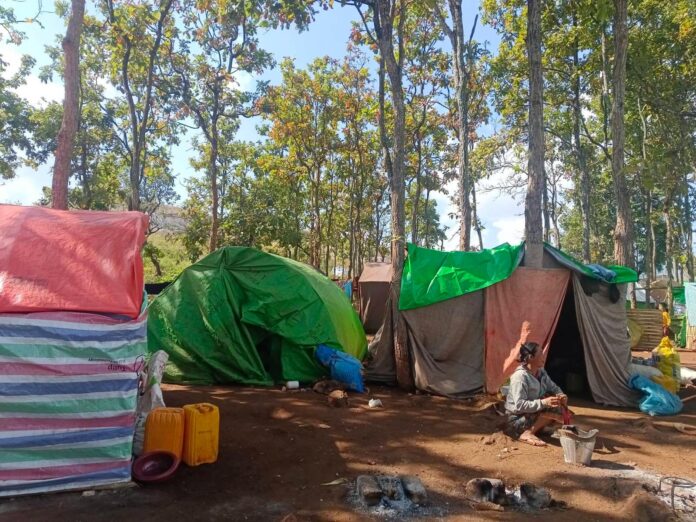By Kantarawaddy Times
Tuesday, February 13, 2024
In Pinlaung Township of Southern Shan State, over 2,000 Karenni Internally Displaced Persons (IDPs) are facing increasing food shortages and hardships due to a lack of aid, said humanitarian aid workers.
Displaced civilians seeking refuge in Phekon-Pinlaung border areas since November 21st are enduring food shortages, inadequate shelter, and clothing. The IDPs have been displaced for over two months and the prolonged displacement has resulted in mounting difficulties in securing necessities.

“At the time when the villagers had farm businesses to work on, they did daily jobs and supported their livelihoods with an income of ten thousand kyats a day. But now, in addition to not having jobs, there are no donors, so it has become more difficult,” said a humanitarian aid porvider.
A displaced civilian expressed his reliance on daily wage jobs for sustenance, which has become increasingly scarce, causing uncertainty.
“I have only been able to rely on my income from being a day laborer to cover my daily living. On an average day, I earn around 2,000 kyats; however, these days, even daily wage jobs are hard to find. There is no job avaible. It’s all very difficult now,” he said.
With the number of internally displaced persons (IDPs) in Shan State surging over 2,000, many are forced to live in makeship tents provided by locals. It has been reported that the over 2,000 IDPs originate from Loikaw, Kyeinthali, and Hpruso townships seeking refuge in Pinlaung Township.
“They are facing difficulties in terms of food, shelter, and medicine. There are no more donors, it has been cut off. There used to be some before, but not anymore,” said a local who stays close to Karenni IDPs.
As clashes continue, the number of IDPs in southern Shan State has increased, leading to a decline in support for food, shelter, and non-food items supllies. There are already over 2,000 displaced Karenni people in Pinlaung Township, and they are scattered in different locations, said IDP relief worker.
Before the military coup, Myanmar faced a humanitarian crisis with about 1 million people requiring urgent aid. In the aftermath of the coup, the number has surged to 18.6 million, constituting a quarter of the country’s population stated the United Nations Office for the Coordination of Humanitarian Affairs (UNOCHA) on February 1st, 2023.UNOCHA’s statement also emphasized to provide humanitarian assistance to the 18.6 million affected individuals and civilian population.




